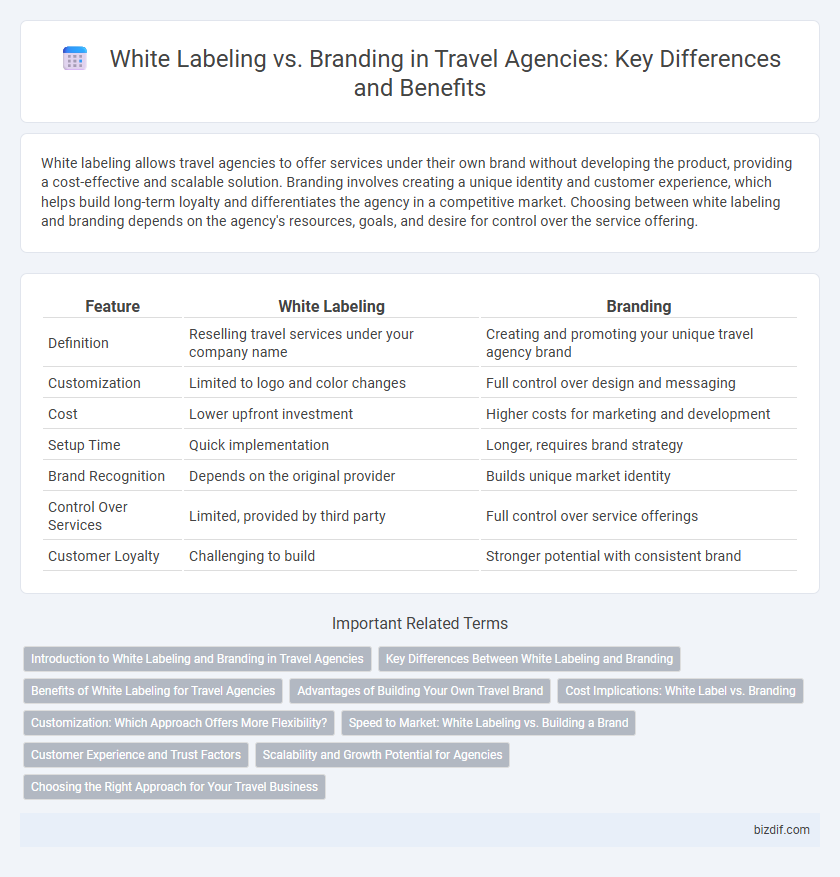White labeling allows travel agencies to offer services under their own brand without developing the product, providing a cost-effective and scalable solution. Branding involves creating a unique identity and customer experience, which helps build long-term loyalty and differentiates the agency in a competitive market. Choosing between white labeling and branding depends on the agency's resources, goals, and desire for control over the service offering.
Table of Comparison
| Feature | White Labeling | Branding |
|---|---|---|
| Definition | Reselling travel services under your company name | Creating and promoting your unique travel agency brand |
| Customization | Limited to logo and color changes | Full control over design and messaging |
| Cost | Lower upfront investment | Higher costs for marketing and development |
| Setup Time | Quick implementation | Longer, requires brand strategy |
| Brand Recognition | Depends on the original provider | Builds unique market identity |
| Control Over Services | Limited, provided by third party | Full control over service offerings |
| Customer Loyalty | Challenging to build | Stronger potential with consistent brand |
Introduction to White Labeling and Branding in Travel Agencies
White labeling in travel agencies involves offering products or services created by another company under the agency's own brand, allowing for a seamless customer experience without the need for product development. Branding, on the other hand, emphasizes building a unique identity and reputation in the travel market through distinct marketing and customer service strategies. Both approaches aim to enhance customer loyalty and market presence but differ in control over product offerings and brand recognition.
Key Differences Between White Labeling and Branding
White labeling allows travel agencies to sell third-party services under their own brand without direct involvement in service creation, while branding involves building a unique identity and customer experience around original travel products. White labeling emphasizes reseller partnerships and streamlined service offerings, whereas branding requires investment in marketing, customer loyalty, and product differentiation. Key differences include control over product development, marketing strategies, and customer relationship management, with white labeling offering quicker market entry and branding focusing on long-term value and recognition.
Benefits of White Labeling for Travel Agencies
White labeling allows travel agencies to offer a wide range of customizable travel products and services without the need for extensive infrastructure or investment in technology. This approach enables agencies to expand their product portfolio quickly while maintaining their own brand identity and customer relationship. By leveraging white label solutions, travel agencies can reduce operational costs, increase revenue streams, and focus on personalized customer service.
Advantages of Building Your Own Travel Brand
Building your own travel brand enhances customer loyalty by offering a unique identity that differentiates your services from competitors. It allows full control over marketing strategies, service quality, and customer experience, fostering long-term growth and reputation management. Independent branding also provides greater flexibility to customize offerings and innovate, driving higher profit margins compared to white labeling.
Cost Implications: White Label vs. Branding
White labeling travel services typically involves lower upfront costs since agencies leverage existing platforms and products without investing in product development or extensive marketing. Branding requires significant financial resources for brand creation, marketing campaigns, and consistent customer experience management to establish market presence and loyalty. While white labeling offers cost efficiency and faster market entry, branding demands ongoing investment but can yield higher long-term value through direct customer relationships and differentiation.
Customization: Which Approach Offers More Flexibility?
White labeling offers extensive customization by allowing travel agencies to tailor their platform with personalized logos, layouts, and content while relying on a third-party provider's backend technology. Branding, on the other hand, involves building a unique identity from scratch, providing full control over design and user experience but requiring more resources and development time. Agencies seeking rapid deployment with flexible design options often prefer white labeling, whereas those pursuing complete ownership prioritize full branding for maximum customization potential.
Speed to Market: White Labeling vs. Building a Brand
White labeling allows travel agencies to launch services rapidly by leveraging pre-established platforms and products without extensive development time. Building a brand requires significant investment in marketing, content creation, and customer trust, often resulting in slower market entry. Travel agencies seeking faster speed to market typically prefer white labeling to quickly capture customer segments while planning long-term branding strategies.
Customer Experience and Trust Factors
White labeling allows travel agencies to offer customizable services under their own brand, enhancing customer experience by providing a consistent and familiar interface. Branding builds long-term trust through unique identity and direct customer relationships, fostering loyalty and personalized interactions. Effective trust factors include transparent communication, reliable service delivery, and seamless booking processes tailored to consumer expectations.
Scalability and Growth Potential for Agencies
White labeling offers travel agencies the ability to quickly scale by leveraging established platforms and reducing development costs, enabling rapid market expansion. Branding, on the other hand, fosters long-term growth potential through unique customer loyalty and differentiated market positioning, although it requires more investment in marketing and brand building. Agencies seeking fast scalability may prefer white labeling, while those aiming for sustainable growth should invest in strong, distinct branding strategies.
Choosing the Right Approach for Your Travel Business
White labeling allows travel agencies to offer customized services under their own name while leveraging established platforms, enhancing credibility and operational efficiency. Branding focuses on building a unique identity and emotional connection with clients through personalized marketing and exclusive experiences. Selecting the right approach depends on your business goals, target audience, and desire for control over the customer journey and service differentiation.
White labeling vs Branding Infographic

 bizdif.com
bizdif.com